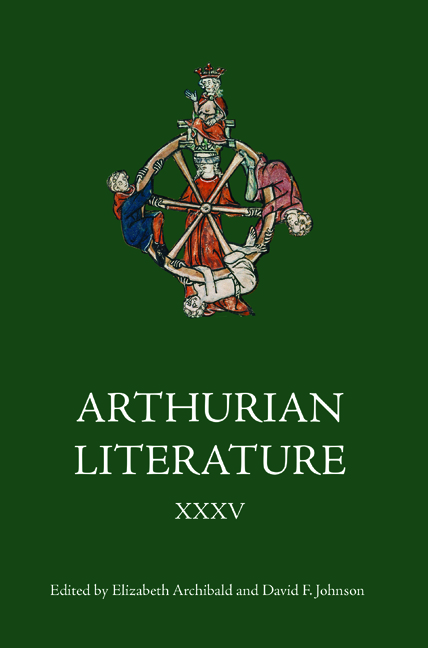Book contents
- Frontmatter
- Contents
- List of Illustrations
- General Editors’ Foreword
- List of Contributors
- I Arthurian Swords I: Gawain’s Sword and the Legend of Weland the Smith
- II Rex rebellis et vir pacificus: Civil War and Ecclesiastical Peacekeeping in the Vita Gildae of Caradog of Llancarfan
- III Once and Future History: Textual Borrowing in an Account of the First War of Scottish Independence
- IV ‘Me rewes sore’: Women’s Friendship, Affect and Loyalty in Ywain and Gawain
- V The Sacred and the Secular: Alchemical Transformation in The Turke and Sir Gawain
- VI ‘The native place of that great Arthur’: Foreignness and Nativity in Sixteenth-Century Defences of Arthur
- VII John Steinbeck’s ‘Wonder-Words’
- VIII The Once and Future King of Atlantis: The Arthurian Figure in Geoff Johns’s Aquaman: Death of a King
- IX Arthur and/or the Grail
- Miscellaneous Endmatter
General Editors’ Foreword
Published online by Cambridge University Press: 11 September 2020
- Frontmatter
- Contents
- List of Illustrations
- General Editors’ Foreword
- List of Contributors
- I Arthurian Swords I: Gawain’s Sword and the Legend of Weland the Smith
- II Rex rebellis et vir pacificus: Civil War and Ecclesiastical Peacekeeping in the Vita Gildae of Caradog of Llancarfan
- III Once and Future History: Textual Borrowing in an Account of the First War of Scottish Independence
- IV ‘Me rewes sore’: Women’s Friendship, Affect and Loyalty in Ywain and Gawain
- V The Sacred and the Secular: Alchemical Transformation in The Turke and Sir Gawain
- VI ‘The native place of that great Arthur’: Foreignness and Nativity in Sixteenth-Century Defences of Arthur
- VII John Steinbeck’s ‘Wonder-Words’
- VIII The Once and Future King of Atlantis: The Arthurian Figure in Geoff Johns’s Aquaman: Death of a King
- IX Arthur and/or the Grail
- Miscellaneous Endmatter
Summary
The material in this volume ranges from Germanic epic and early Welsh saints’ lives to twenty-first century comic books. This is characteristic of the Arthurian Literature series which since its inception in 1981 has always cast its net very widely over Western European culture. We are delighted that the founding editor, Richard Barber, has contributed a characteristically stimulating interdisciplinary study of swords belonging to Arthurian and other heroes. He himself has heroic stature in the world of Arthurian studies, both as an historian and as an editor and publisher. Andrew Rabin's discussion of Caradog's Vita Gildae throws light on the complex attitudes to Arthur of contemporaries of Geoffrey of Monmouth in a time of political turmoil in England, the Anarchy: Arthur is represented both as a tyrannical ruler and a conciliator, an ambivalence which Rabin notes in other Latin accounts of the king produced at this time. Christopher Berard also considers the use of Arthurian material for political purposes: borrowings from Geoffrey's Historia appear in a chronicle of Anglo-Scottish relations in the time of Edward I, a well-known admirer of the Arthurian legend. Berard argues that these borrowings would have appealed to the clerical élite of the time. Usha Vishnuvajjala focuses on women and their friendships in Ywain and Gawain, the only known close English adaptation of a romance by Chrétien. She argues that this text does not align with received wisdom about medieval friendship, or with conventional binaries about stereotypical gendered behaviour. Natalie Goodison considers the mixture of sacred and secular in The Turke and Gawain, and finds fascinating alchemical parallels for a puzzling beheading episode. Mary Bateman discusses the views on native and foreign sources of three sixteenth-century defenders of Arthur, both English and Welsh – John Leland, John Prise and Humphrey Llwyd – and their responses to the criticisms of Polydore Vergil.
In twentieth-century reception history, John Steinbeck was an ardent Arthurian enthusiast: Elaine Treharne and William J. Fowler look at the significance of his annotations to his copy of Malory as he worked on a modern adaptation, the posthumously published The Acts of King Arthur and his Noble Knights.
- Type
- Chapter
- Information
- Arthurian Literature XXXV , pp. vii - viiiPublisher: Boydell & BrewerPrint publication year: 2019

